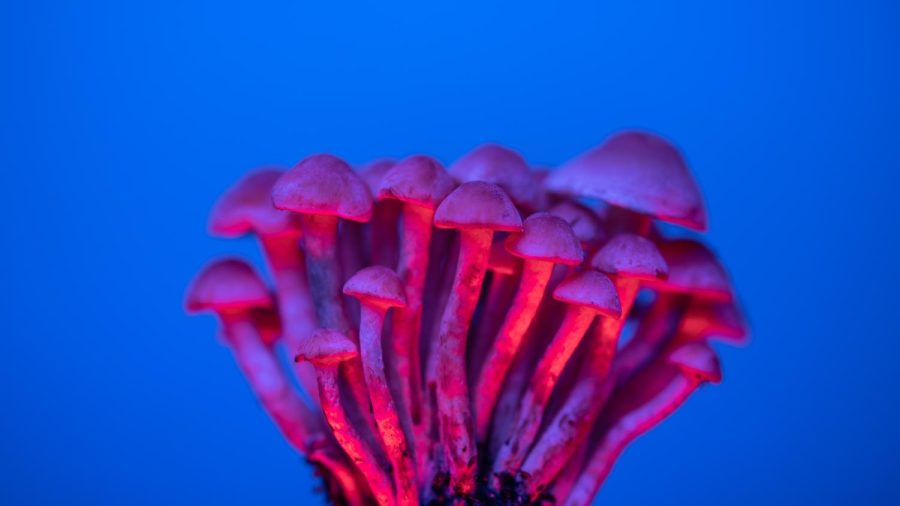Barney: Let Utahns Do Psychedelics
Photo by Marek Piwnicki: https://www.pexels.com/photo/macro-photography-of-a-psilocybin-mushroom-13695325/
March 3, 2023
The War on Drugs had serious repercussions — its failure caused an increase in crime and human rights abuses all over the world, particularly in low income areas. Beyond that, it has fundamentally shifted perceptions on drug use.
There was significant fear in the latter half of the 20th century around psychedelics, which set back research on the benefits of these drugs by decades. And now, S.B. 200 from Utah’s 2023 General Legislative Session seeks to regulate psilocybin, the active ingredient in magic mushrooms, in a similar way to how we regulate medical marijuana.
Psychedelic drugs have shown to have positive benefits, but more research needs to be done before we can implement a blanket recreational legalization. With that said, regardless of the lack of research towards psychedelics, it’s clear that continuing our War on Drugs policies is detrimental. S.B. 200 and similar bills are exactly the type of legislation that we need in Utah and federally.
The Case for Psychedelics
Psilocybin has been shown to help people with mental health disorders, such as PTSD and types of anorexia. Fungi like Lion’s Mane can reduce the risk of Alzheimer’s in adults. Furthermore, other psychoactive drugs such as ketamine have undergone clinical trials for depression treatment — results are mostly positive with the correct dosage.
While research into the positive benefits of psychedelics dates back to the 1950s, current issues involve stigmas around psychedelics and the scheduling of similar substances.
S.B. 200 creates a safe way to regulate, grow and distribute psilocybin products. It’s handled in a similar way to how we regulated medical marijuana in its early years: creating a licensing and inventory management system that ensures psilocybin-containing products are given to those who need them.
This is a great contrast to what we’ve had historically — it’s surprising that Utah has made a move in this direction given the religious makeup of the state, as well as the pushback that Utah had around medical marijuana in its early days.
It’s clearly the right move, since it’s been shown that prohibition is ineffective at best, and at worst targeted minority populations for nefarious purposes. Drug policy needs to move away from prohibition in a way that is effective for everyone.
Anticipated Skepticism
Doubting this article is understandable, but I’d urge you to think critically. As a kid I remember being at school and getting taught about drugs by a police officer — the D.A.R.E program. The unfortunate reality is that drug use isn’t stopped by “just saying no.” If it was that simple, the opioid epidemic wouldn’t have happened, heroin and cocaine wouldn’t have been used to target Black people in the ’60s and ’70s, and there wouldn’t be a need for D.A.R.E in the first place.
Several myths surrounding the nature of psychedelics were popularized by the D.A.R.E. program and other notions, including falsehoods that psychedelic drugs have a direct link to psychosis, which they don’t. I also remember being told drugs like LSD would stay in my spine forever, or that ecstasy would make me suicidal — another myth. This disinformation campaign spurred on by the War on Drugs is pointless and harmful. Rather than lying to ourselves about the negative benefits of drugs, we should face the reality that they can be a useful tool.
Now this doesn’t mean we should make every psychedelic recreationally legal. Psychedelics do have negative effects in certain people, particularly in those who already have psychosis or are immunocompromised. Medicine is also extremely complex, so dosing is important to regulate in ensuring people don’t accidentally poison themselves. Some psychedelics increase tolerance based on frequency of consumption, which makes dosing tricky and risks overdose if the person administering the dose isn’t medically trained. Ketamine in particular can be addictive and kill you if the wrong dose is given.
This is why legislation like S.B. 200 is necessary. If your goal is less drug use, the answer isn’t to nix research on drugs with potentially positive use cases or ban them outright. We need to encourage regulation as a method of improving the safety of psychedelic consumption.
Our War on Drugs has already failed. Prohibition and restrictions don’t work and actively harm us. Allowing reasonable use and research into psychoactive substances will allow us to break the cycle of failure and move to an effective solution.
Let’s swallow our pride and do something that works.








